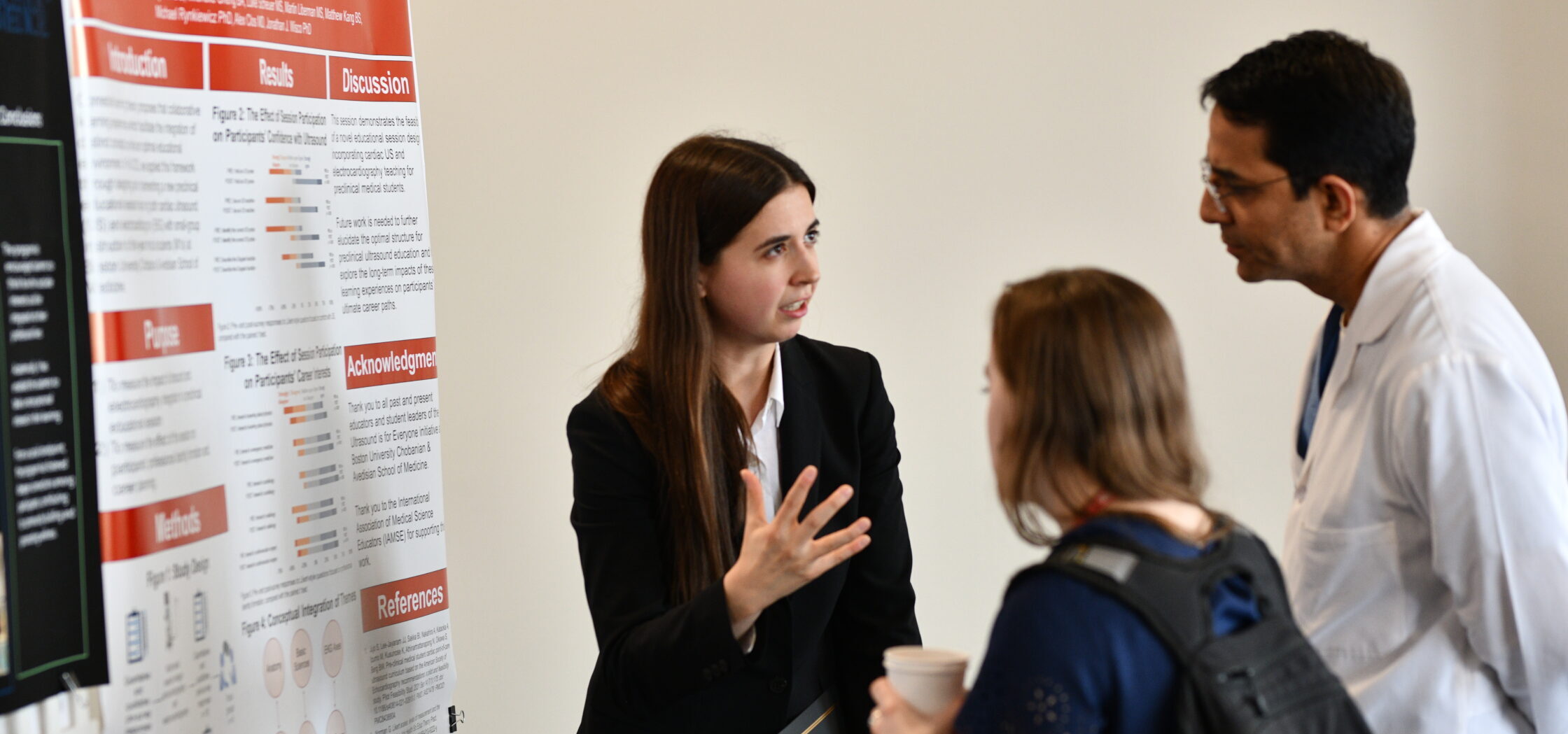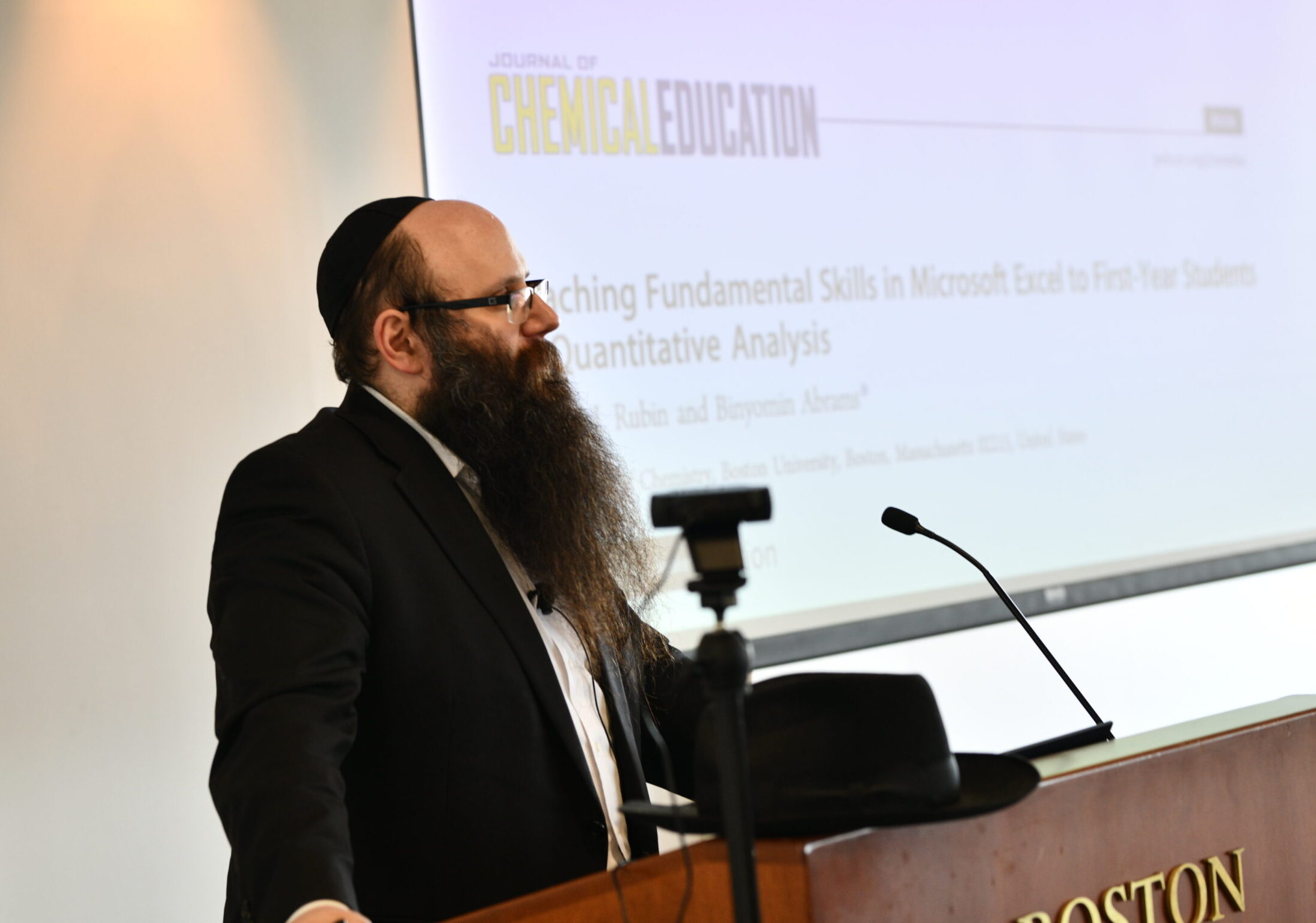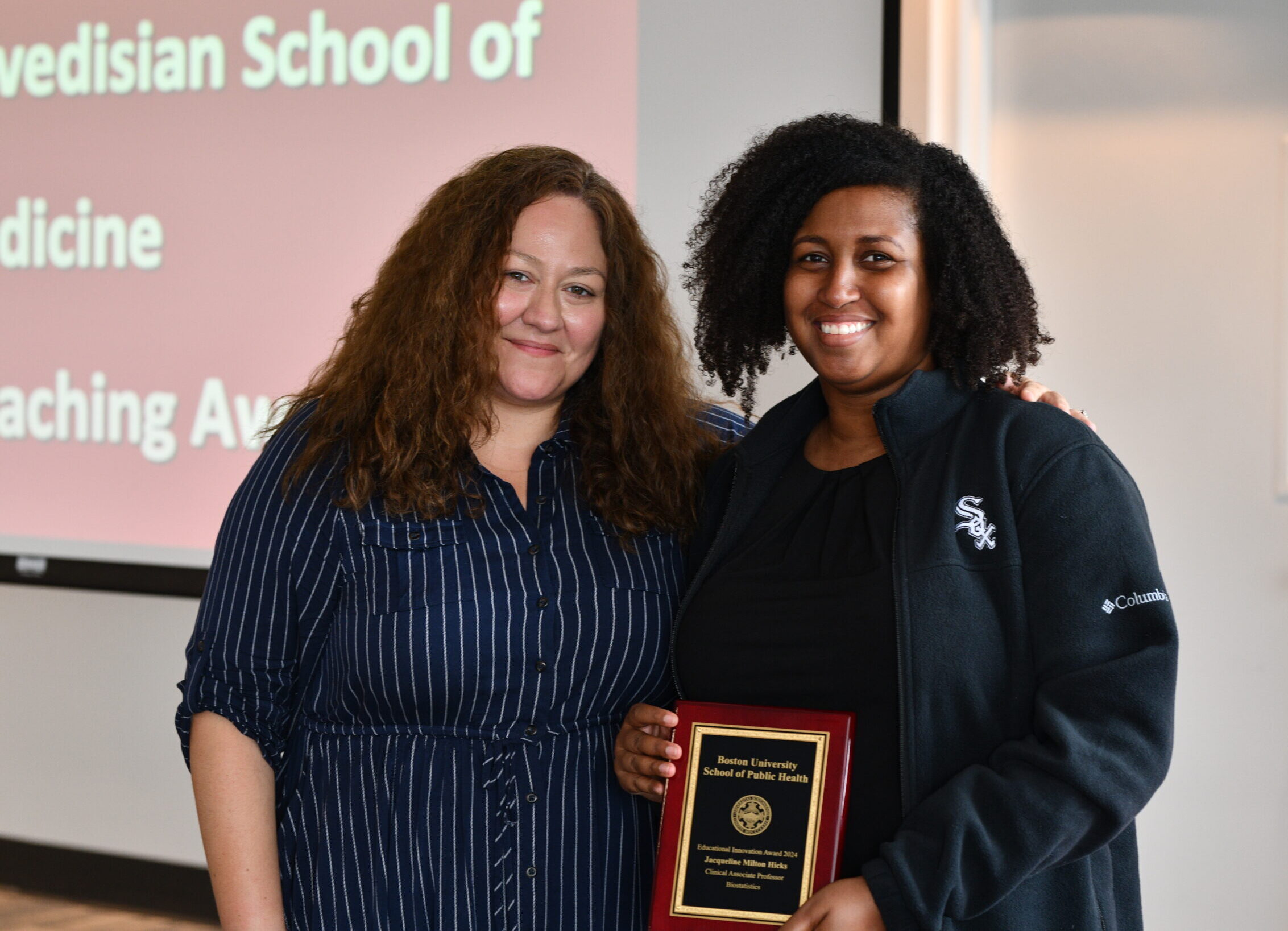19th Annual John McCahan Medical Campus Education Conference Highlights Collaborative Education
 Medical student Lindsey Claus explaining the project she worked on which won Best Student Abstract award
Medical student Lindsey Claus explaining the project she worked on which won Best Student Abstract award
On May 23, students, faculty, staff, residents and fellows from across the Medical Campus gathered in Hiebert Lounge, and online, for the 19th annual John McCahan Medical Campus Education Conference.
“The importance of educational research and the role of educators continues to grow, and we recognize how important it is to continue to develop and study the most effective way to educate our students,” said Hee-Young Park, PhD, professor and chair of medical sciences & education and associate dean for faculty affairs, in her welcoming address to approximately 50 in person attendees and another 25 online.
Named for John McCahan, MD, who served for 30 years as the school’s associate dean for academic affairs and interim medical school dean, the conference focus on collaborative education was highlighted in a keynote address by Binyomin Abrams, PhD, on the “Evolution of a Student-Driven Collaborative Research Project to Address Equity in STEM Participation.”
 Keynote speaker Binyomin Abrams, PhD
Keynote speaker Binyomin Abrams, PhD
“We have to look at the learner and see what assets they bring, but at the same time, we also have to look at the circumstances behind how they’ve grown up cognitively,” said Abrams, a research associate professor in chemistry and director of the College of Arts & Sciences Program in Science Education. He is a recipient of the Metcalf Award for Excellence in Teaching, the university’s highest teaching honor, and the Templeton Prize for Excellence in Student Advising.
“You can either make chemistry hard and fun or hard and boring,” he said. “It’s going to be hard for most students, but at least we can try to make it hard and fun.”
Throughout Abrams’s teaching career, he’s looked for ways to engage students, tasking them to work on solutions to overcome barriers to learning.
“If a student comes to you to complain, or bemoan a certain truth, say ‘Great! How about you and I fix that? How about we try to change things?” said Abrams. He formed the award-winning Abrams Research Group, with student-driven research focused on “developing novel approaches to teaching introductory chemistry that excite students across disciplines.”
One pivotal event in Abrams’s teaching career occurred at a 2018 meeting when faculty said students were not retaining a basic concept known as Lewis structures that illustrate the bonds between a molecule and electrons.
“I vividly remembered teaching it,” recalled Abrams. “The issue was that students were getting to organic chemistry and it’s as if they had learned nothing.”
That one meeting spawned six years of research projects that included students as researchers looking at various ways to deliver and retain knowledge.
They found that traditional chemistry lectures weren’t working and that students retained more if they viewed videos, at their own pace outside the classroom, with students required to pause and answer questions embedded in the videos.
Working with BU’s Educational Resource Center, a free service to help students navigate academics, chemistry education teams created OrgoPrep, a six-week award-winning summer program to prepare students for organic chemistry using question embedded videos and peer mentors.
Subsequent assessments found that students participating in OrgoPrep were 98% more confident entering organic chemistry, 75% less anxious and three times less likely to have a negative outcome. That also was largely true for students from historically marginalized groups, like underrepresented minorities and low-income students, said Abrams.
“So, giving students an opportunity to increase their confidence, their self-advocacy, decrease nervousness and anxiety has downstream effects. It can really transform student lives,” he said.
 Jacqueline Hicks, PhD, (right) clinical associate professor of biostatistics, receives the School of Public Health Educational Innovation Award from SPH Assistant Dean Amanda Velez.
Jacqueline Hicks, PhD, (right) clinical associate professor of biostatistics, receives the School of Public Health Educational Innovation Award from SPH Assistant Dean Amanda Velez.
Conference attendees chose from five workshops this year:
- Redesigning Courses in the School of Medicine to Promote Flipped Learning and Application in Blackboard Ultra presented by Molly Cohen-Osher, MD, MMedEd, and Priya Garg, MD.
- Deconstructing Concepts of “Professionalism” to Foster an Inclusive Medical Education Experience presented by Kimberly Zayhowski, MS, CGC, and Lillian Sosa, MS’14, CGC.
- Creating a Best Self Toolkit: Learning and Understanding Strategies Based on Positive Psychology Principles for Promoting Being Our Best Selves presented by Marisol Lopez, PhD, and Carly Block, PhD, CMPC.
- Feedback Not Evaluation: Using Reflection for an Effective Constructive Dialogue Between Students and Faculty presented by Felipe Agudelo, PhD, MPH; Jeselle Dookran, DO, MSc; Ephraim Senkyire, BSc, RGN, CGNC and Jeff Markuns, MD, EdM.
- Applying Dual Processing Theory to Feedback Conversations presented by Jonathan Wisco, PhD, and Catlin Neri, MD, MPH.
John McCahan Educator Awards
Graduate Medical Sciences Faculty Recognition Award—Robin Cotton, PhD, associate professor in the anatomy / biomedical forensics program
Henry M. Goldman Faculty Appreciation Award – Predoctoral Category—Sepideh Novid, DMD, clinical assistant professor of general dentistry
Henry M. Goldman Faculty Appreciation Award – Postdoctoral Category—Melih Motro, PhD, assistant clinical professor orthodontics & dentofacial orthopedics
Crest Oral-B P&G Professional Oral Health Excellence in Teaching the Basic Sciences Award—Yoshiyuki Mochida, PhD, DDS, clinical professor, molecular & cell biology
Chobanian & Avedisian School of Medicine Affiliate Teaching Award—Michael Slama, MD, PhD, adjunct assistant professor of neurology.
Chobanian & Avedisian School of Medicine Kaiser Permanente Silicon Valley Affiliate Teaching Award—Subbu Lakshmi, MD, assistant professor of medicine
School of Public Health Educational Innovation Award—Megan Healey, MD, MPH, clinical associate professor of epidemiology, and Jacqueline Hicks, PhD, clinical associate professor of biostatistics
Abstracts Award Winners
Best Faculty & Staff Abstract – “CASPer Situational Judgement Test Score as a Predictor of Success,” John Weinstein, PhD, MS; Robert O’Brien, MPAS, MPH; Dan Tzizik, DrPH, MHS; Aliza Stern, MMSc, PA-C.
Best Resident & Fellow Abstract—”Leveraging Virtual Reality (VR) for Interprofessional Competency Development to Address Social Drivers of Health,” Joo Lee, MD; Stacey Zawacki, DrPH, RDN; Heather Miselis, MD, MPH; Linda Sprague Martinez, PhD; Aliza Stern, MMSc, PA-C; Rachel Thompson, MD; Maria Emilia Bianco Galindez, PhD, MSW; Pablo Buitron de la Vega, MD, MSc.
Best Student Abstract—“A Novel Preclinical Cardiac Ultrasound and Electrocardiography Program and its Impact on Professional Identity Formation,” Lindsey Claus, MS; Rutvin Kyada, BA; Michelle Cheng, BA; Luke Scheuer, MS; Martin Liberman, MS; Matthew Kang, BS; Michael Rynkiewicz, PhD; Alex Clos, MD; Jonathan Wisco, PhD.
View all posts